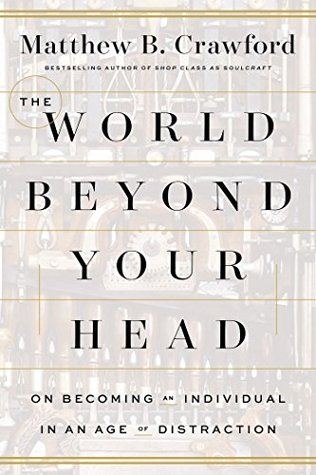More on this book
Community
Kindle Notes & Highlights
Read between
November 12, 2017 - January 14, 2018
charity of interpretation
This would seem to be a particularly Jewish sort of wisdom—an emphasis on observance as opposed to the Protestant emphasis on inner state. It relieves one of the burden of “authenticity.”
We should “pay primary attention to what we do and express, and not … care too much for what we feel.”
Subjectivism can’t make sense of the experience of achieving greater clarity in one’s evaluative outlook, and it can’t accommodate the closely related idea of an earned individuality of judgment, as opposed to mere idiosyncrasy.
Søren Kierkegaard wrote that “only when the sense of association in society is no longer strong enough to give life to concrete realities is the Press able to create that abstraction ‘the Public,’ consisting of unreal individuals who never are and never can be united in an actual situation…”9 Under the influence of this notion, each of us begins to view himself as a representative of something more general. We bring this “representativeness” to our encounters with others. This flattens out relationships and makes them more abstract.
It is hard to see where this fog is coming from. It is hard to avoid it, and hard to take issue with it. Kind of like the music coming out of speakers in the ceiling.
On Ryan’s account, making a musical instrument seems to parallel the process of making music. It doesn’t feel very “artistic” to practice scales endlessly; like the preparation of organ pipes, “a monkey could do it.” In both cases the expressive element, that last 3 percent, rests on a large base of technical proficiency.
In this way the organ maker becomes responsible to a wider community of his contemporaries, outside the charmed circle of his guild. He must put his cherished endeavor in its proper place and become public-spirited, out of financial necessity. This helps him gain perspective on his own preoccupations, which otherwise may threaten to become obsessions.
manufactured experiences promise to save us from confrontations with a world that resists our will.
With the help of Hegel, I suggested that it is by bumping up against other people, in conflict and cooperation, that we acquire a sharpened picture of the world and of ourselves, and can begin to achieve an earned independence of judgment.
At such moments, the possibilities for beautiful human action in the world as it is—the undiscovered possibilities of fit—seem inexhaustible.
To reclaim the real in education would be to understand that one is educating a person who is situated in the world and orients to it through a set of human concerns. This is more effective than addressing oneself to a generic “rational being” and expecting him or her to get excited.
Only beautiful things lead us out to join the world beyond our heads.


